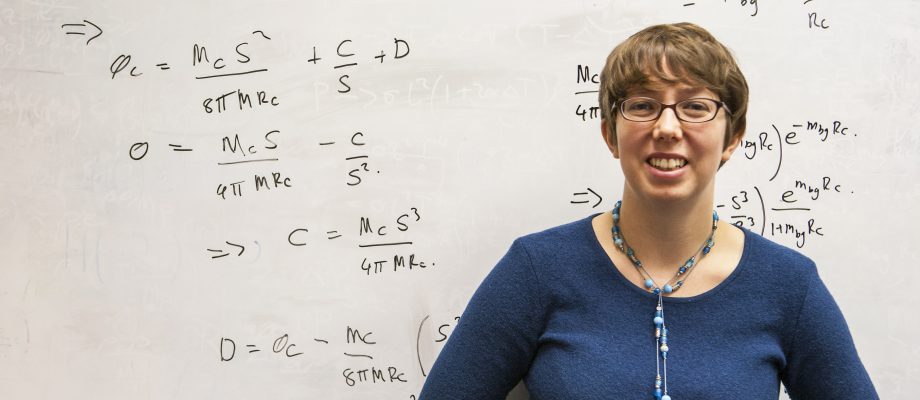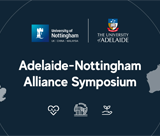
Dark energy researcher given major award to take on Einstein’s theory
December 20th, 2016
It is one of the biggest conundrums facing scientists – understanding why our universe is expanding. And the answers could soon be unlocked by Dr Clare Burrage following an £800,000 Research Leadership Award from the Leverhulme Trust.
Her ambitious project will maximise our ability to detect dark energy – new forces and particles that make up 70 per cent of the universe – and bring greater understanding of what this means for well-known, but flawed, theories on gravity and quantum mechanics.
Dr Burrage, of the School of Physics and Astronomy at The University of Nottingham, received one of just 13 national Research Leadership Awards after being nominated by senior colleagues.
The prestigious awards are granted every three years to allow scholars to build a research team for their distinctive projects. Dr Burrage’s funding covers five years and will fund four positions. The University will support the work by funding an additional two PhD places.
She said: “The expansion of our universe is accelerating, and we don’t understand why. The observational evidence for this is so compelling that its discoverers were awarded the Nobel Prize in 2011, and yet none of our current theories explain how this can be happening.
“We are forced to conclude either that Einstein’s Theory of General Relativity is wrong, or that there are particles in our universe totally unlike anything we have seen so far. These new forces and particles are called dark energy, and they make up 70 per cent of our current universe, yet we understand essentially nothing about them. “
Dr Burrage’s research has previously looked at testing theories of dark energy against a wide variety of observation from laboratory scales to cosmological measurements.
She said “This is a new approach to tackling the problem of dark energy, and has shown that it is possible to make progress in understanding what the universe is doing on the very largest time and distance scales by performing small scale, but high precision, measurements in the laboratory.
“I will lead a team of researchers to exploit these new opportunities allowing us either to detect dark energy in the laboratory, or exclude currently popular models. The experiments have the opportunity for a first detection of dark energy.”
Dr Burrage is a rising star in Nottingham, having arrived at the University as an Anne McLaren Fellow in 2011. The fellowships are aimed at outstanding female scholars in science, technology, engineering and medicine. She has been a Royal Society University Research Fellow since 2013 and also features in one of the most watched episodes of the University’s award-winning Sixty Symbols videos. In 2015, Dr Burrage was awarded the Maxwell medal and prize by the Institute of Physics for outstanding contributions to the field of dark energy research.
Professor Dame Jessica Corner, Pro-Vice-Chancellor for Research and Knowledge Exchange, said: “Clare is an outstanding individual and has long been championed by the University as an ambassador for women in science. Her work with the Sixty Symbols video series is just one of the ways she helps further public understanding of science through her superb skills in public engagement.
“We had a number of excellent nominations from within the University but we selected Clare due to her pursuit of truly ground breaking science. We are delighted she has been successful in achieving this most prestigious award.”
In addition to the Research Leadership Award academics from The University of Nottingham have secured three further awards under the Trust’s Major Research Fellowship scheme.
The awards enable researchers in the humanities and social sciences to devote themselves to a single research project for two or three years.
Sharon Monteith, Co-Director of the Centre for Research in Race and Rights and Professor of American Studies, has been awarded £161,000 for her project on The Civil Rights Movement.
Richard Bell, Professor of Theology, secured £152,000 to research The Theology of Wagner’s Ring Cycle, and Professor of History, Elizabeth Harvey, has been awarded £155,000 for her project on gender, race and labour in Nazi-occupied Europe.
Dame Jessica added: “Leverhulme Trust fellowships are highly sought after and for The University to have secured three out of a possible 33 awards is testament to the calibre of research being undertaken. I’d like to offer my congratulations to all involved.”
Professor Monteith’s project The Civil Rights Movement comprises an archival and interdisciplinary study that will extend civil rights historiography and include the recovery of neglected activists, activist-writers and texts.
She said: “I’m thrilled to be a recipient of a research fellowship. It represents a precious opportunity to focus entirely on research for a sustained period, and in my case to undertake archival research in the US, to bring my project to completion.”
Professor Bell’s project will focus on Christian Theology, Wagner and the Natural Sciences. He said: “I will explore issues such as the composer’s appropriation of Theology and Philosophy, his work on myth and his understanding of nature with a view to teasing out the many theological themes which run throughout the artwork, their moral and spiritual significance, and how they can be interpreted today.”
Professor Harvey added: “I am extremely honoured to be the recipient of a Leverhulme Major Research Fellowship, and I am very excited about having the opportunity to undertake my project on Making Women Work: Gender, Race and Labour in Nazi-occupied Europe.”
Tags: award, Centre for Research in Race and Rights, Clare Burrage, dark energy, Elizabeth Harvey, Institute of Physics, Jessica Corner, Physics, prize, research, Richard Bell, School of Physics, Sharon Monteith
Leave a Reply
Other
Trusted Research update: changes to technologies requiring an export control licence
The UK Government has issued an updated UK Strategic Control List, introducing additional export control measures […]

Adelaide-Nottingham Alliance: join Vice-Chancellors at event celebrating global partnership
Staff, students and researchers are invited to join the Vice-Chancellors of the University of Nottingham and […]

